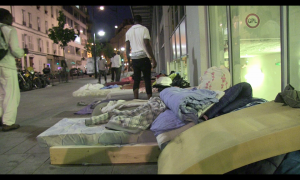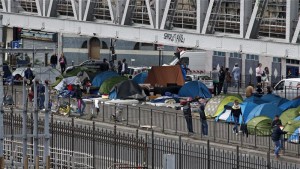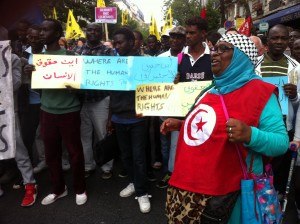Homeless migrants leave French shelters for the streets
Waking at dawn to the shouts of police and the bright headlights of buses waiting to take them away, Yacoub Mansour and more than 300 other migrants living under a bridge were becoming aware that their time in this part of Paris was up.
In the early hours of June 2, 27-year-old Mansour, a Libyan, and the others – mainly from Sudan and Eritrea – were told by police to get on the buses and leave their tents and cardboard for proper shelter.
It was not what they had expected.
With dedicated asylum shelters overbooked, Mansour was brought instead to a hotel – part of the emergency housing used by government to help the homeless, an increasing proportion of whom are asylum seekers.
“We were two to a room,” said Mansour.
Caught up in an asylum system that a parliamentary committee report described as mired in crisis, Mansour is among the migrants who say the shelters are even worse than the streets they are pulled from.
“Numerous migrants return from so-called shelters within days – sometimes in just hours,” said Eve Shahshahani, asylum programme manager for ACAT, a Christian human rights organisation.
Asylum and shelter“They have to go back to where they camped to get free food from NGOs and neighbours. Otherwise they cannot survive. The accommodation is short-term, and many of them are asked to leave after one night.”
Of some 65,000 people who applied for asylum in France in 2014, fewer than 15,000 gained access to asylum lodgings. The remaining 50,000 or so sleep in emergency shelters, with family and friends, or in the makeshift camps across the country from the streets of Lyon and Paris to the squalid “jungles” of Calais.
 |
| Yacoub Mansour has slept outdoors across the capital, awaiting proper shelter [Kyle G Brown/Al Jazeera] |
The number of people fleeing to France for protection has almost doubled between 2007 and 2014. But only a few thousand new shelter places have been created over that time, leaving a rapidly rising number of asylum seekers homeless for the 18 months or more that it takes on average to process their claims.
As a black Tuareg in Libya, Mansour said he was suspected of having fought for the late dictator Muammar Gaddafi, and feared his days were numbered. He described troops going from house to house, looting and carrying out revenge attacks.
When his brother, a former soldier, was accused of theft and taken away by troops, Mansour went into hiding until he and three friends boarded a boat to cross the Mediterranean Sea to Europe.
RELATED: Migrants disrupt tunnel traffic between France and UK
He and a few dozen migrants took trains from Italy into France, disembarking when controllers checked for tickets that no one had. And so they continued, getting off one train and waiting for another, until Mansour and the dwindling group of travellers realised they were finally in France.
‘There is no drinking water’
Like thousands of others, Mansour arrived with dreams of a fresh start in the land of liberté, égalité and fraternité. But if the cardboard mat under the bridge at La Chapelle in the north of Paris didn’t disillusion him, his third stop – the homeless shelter on the other side of the city – certainly did.
“There is no drinking water. They told us to drink the water in the washroom. But when you go in, there’s excrement in the toilet, on the floor – everywhere.”
Mansour recounted his journey while looking over Les Jardins d’Eole, a large rambling park where locals and migrants sit on the grass or play football. Later, they will break their Ramadan fast with roast chicken, salad, and fresh bread – food provided by local residents and NGOs – before setting up camp in a nearby square.
“It’s a thousand times better [than the shelter]. The water is so clean,” said Mansour of the large fountain which, at the turn of a tap, dispenses water to drink or wash up at any time of day. Locals may take it for granted, but for those who have gone days with little food and drink, it is an oasis.
But here, too, they live on borrowed time.
On June 19, city officials “proposed” alternative accommodation, as riot police arrived to seal off the exits at either end of the street. Almost 200 migrants were ushered onto buses and taken to their next destination – no one was told where.
Ivoa Alavoine, the cabinet assistant director of the City of Paris, oversaw the eviction. She told Al Jazeera that the shelters are safe and clean, and that migrants are fed.
While that contrasts sharply with the testimony of some migrants and human rights groups, others, like Eritrean Omar Ibrahim, report having eaten and slept well at some shelters.
But Ibrahim, too, said he is invariably made to move on after two or three days, and then is back on the streets.
In the past four weeks, 25-year-old Ibrahim said he has slept in more than 10 different locations – most of them outside. After spending a year in an Eritrean prison before escaping, though, he’s not particularly bothered.
| They chase us like animals. We have crossed the ocean and gone days without food. We just want a place to sleep and something to eat, that’s all! |
“If they want to help me here, they can help,” Ibrahim said with a shrug. “If not, no problem. I want freedom only.”
Slow asylum process
The lack of proper shelter, repeated displacements and heavy-handed police have prompted dozens of French academics and non-governmental organisations to sign a petition demanding an end to what they call “public aggression” towards their “brothers and sisters”.
It’s a glimpse of the kind of solidarity that has mobilised residents and activists to visit camps, cook for migrants, take them in, and make donations to those who are evicted and had no time to retrieve their belongings. Many sleep outside without blankets.
Migrant camps near international train stations, the Seine River and famous landmarks across the world’s most visited city have embarrassed the French government and moved it to action.
Interior Minister Bernard Cazeneuve unveiled plans last month to reduce asylum processing times from two years to nine months. The plans would also free up more than 4,000 shelter beds this year, and another 4,000 in 2016.
The French Parliament is fast-tracking an asylum reform bill to align French law withEU directives in time for the July 20 deadline. If passed, it would grant asylum seekers access to legal counsel and allow authorities to relocate refugees to other – less crowded – parts of the country.
But rights groups say the modest measures won’t go far.
“There are more than 45,000 new asylum applications each year. And each application can take one or two years – so when [Cazeneuve] says he will create 4,000 or 5,000 new places, it’s far from enough,” said Caroline Maillary, a legal expert at Gisti, a French migrant rights organisation.
“What’s needed is four or five times that many.”
France’s neighbours are more welcoming to asylum seekers. France granted protection to close to 20,000 people in 2014, compared to 33,000 in Sweden and 47,000 in Germany.
Not only are France’s overall numbers lower, its acceptance rate is half that of its neighbours – about a quarter of applicants were granted asylum in France last year, compared to the EU average of 45 percent.
“In treating people this way,” Maillary said, “the government is sending the message: ‘Do not come to France. You will not find shelter; the asylum system is not good.’ Indeed, that’s why many are going on to Germany and Sweden. They know that when they apply for asylum in Sweden, they’re given shelter right away.”
‘They chase us like animals’
Back in the north of Paris, migrants and activists have resumed what they describe as a game of hide-and-seek with the police. Their latest camp in a small square is not likely to last long.
 |
| In addition to harsh conditions, migrants often face resentment from the locals [Kyle G Brown/Al Jazeera] |
As Mansour and the others meet volunteers and gather blankets for the night, two young men from the area get into an argument with one of the asylum seekers. One man steps away from the crowd and pulls out what looks like a knife.
But he thinks better of it when, one by one, a dozen of the young men march in his direction. The entire scene lasts no longer than five minutes, but it’s a reminder that the migrants are vulnerable not only to the elements, but also to some French who resent their presence in their area.
There are now rumours of an impending police raid, raising fears of clashes with riot police – like one three weeks ago that left migrants, activists and at least one elected official injured.
“If I hear the siren, I’m going to run – I’m scared,” said Mansour.
“They chase us like animals. We have crossed the ocean and gone days without food. We just want a place to sleep and something to eat, that’s all! We settled in the street because the government couldn’t do anything for us. But now it’s a hunt for immigrants.”





